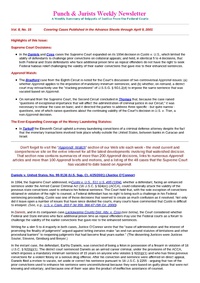In 1994, the Supreme Court addressed, in Custis v. U.S., 511 U.S. 485 (1994), whether a defendant, facing an enhanced sentence under the Armed Career Criminal Act (18 U.S.C. § 924(e)) (ACCA), could collaterally attack the validity of the previous state convictions used to enhance his federal sentence. The …
This is the companion case to Daniels v. U.S., 532 U.S. 374 (2001) (both of which were decided on the same day by identical 5 to 4 margins). In both cases, the Court was faced with the question of whether Federal postconviction relief is available when a prisoner challenges …
This case is noted for its discussion of two Apprendi issues: a) whether Apprendi requires the jury to determine the facts needed to impose a mandatory minimum; and b) whether, on a remand, the court can reimpose the same sentence by "stacking" sentences.
This is an interesting Apprendi …
On remand from the Supreme Court, the Second Circuit agreed to rehear this drug sentencing case en banc because of its "exceptional importance"; and it requested the parties to address three specific questions.
This brief per curiam order is phase two of one of the 49 convictions vacated …
Here, after the Supreme Court vacated the Eleventh Circuit's previous decision in this case in light of Apprendi, the Court held that such a remand did not require it to treat the case as though the Apprendi issue had been timely raised.
After the Eleventh Circuit's earlier unpublished …
Here the Court upheld a money laundering convictions of a criminal defense attorney despite the fact that the monetary transactions involved took place wholly outside the United States, between banks in Curacao and Israel.
The defendant in this case, a criminal defense lawyer, was convicted of conspiracy to …
